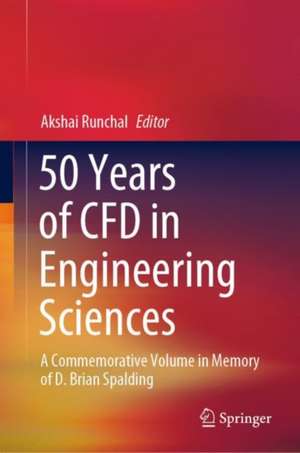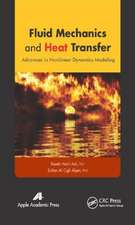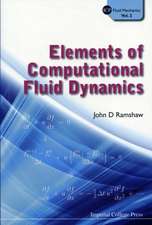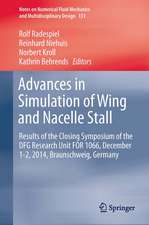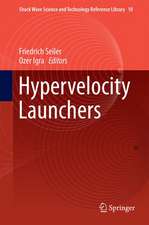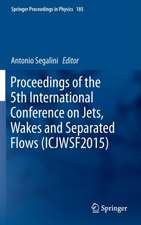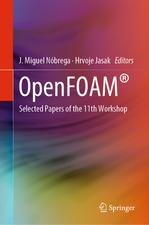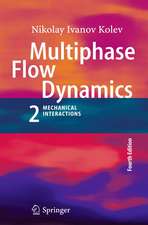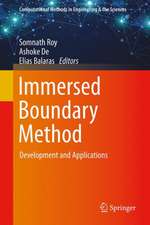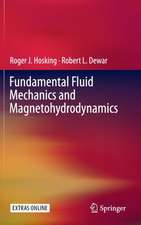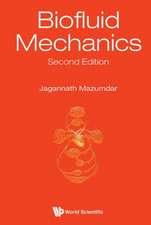50 Years of CFD in Engineering Sciences: A Commemorative Volume in Memory of D. Brian Spalding
Editat de Akshai Runchalen Limba Engleză Hardback – 10 mar 2020
| Toate formatele și edițiile | Preț | Express |
|---|---|---|
| Paperback (1) | 988.47 lei 38-44 zile | |
| Springer Nature Singapore – 10 mar 2021 | 988.47 lei 38-44 zile | |
| Hardback (1) | 1153.34 lei 3-5 săpt. | |
| Springer Nature Singapore – 10 mar 2020 | 1153.34 lei 3-5 săpt. |
Preț: 1153.34 lei
Preț vechi: 1406.52 lei
-18% Nou
Puncte Express: 1730
Preț estimativ în valută:
220.70€ • 228.03$ • 183.59£
220.70€ • 228.03$ • 183.59£
Carte disponibilă
Livrare economică 26 februarie-12 martie
Preluare comenzi: 021 569.72.76
Specificații
ISBN-13: 9789811526695
ISBN-10: 9811526699
Pagini: 947
Ilustrații: XXI, 947 p. 553 illus., 345 illus. in color.
Dimensiuni: 155 x 235 mm
Greutate: 1.72 kg
Ediția:1st ed. 2020
Editura: Springer Nature Singapore
Colecția Springer
Locul publicării:Singapore, Singapore
ISBN-10: 9811526699
Pagini: 947
Ilustrații: XXI, 947 p. 553 illus., 345 illus. in color.
Dimensiuni: 155 x 235 mm
Greutate: 1.72 kg
Ediția:1st ed. 2020
Editura: Springer Nature Singapore
Colecția Springer
Locul publicării:Singapore, Singapore
Cuprins
Brian Spalding: Some Contributions to Computational Fluid Dynamics during the Period 1993 to 2004.- The SUPER Numerical Scheme for the discretization of the convection terms in Computational Fluid Dynamics computations.- Examples of Decompositions for Time and Space Domains and Discretization of Equations for General Purpose Computational Fluid Dynamics Programs and Historical Perspective of Some Key Developments.- A Finite Volume Procedure for Thermofluid System Analysis in a Flow Network.- Modeling Proton Exchange Membrane Fuel Cells – A Review.- CFD Modeling of Data Centers.- Integral Transform Benchmarks of Diffusion, Convection-Diffusion, and Conjugated Problems in Complex Domains.- A Comparison between FEM and FVM via the Method of Weighted Residuals.
Notă biografică
Dr. Akshai K. Runchal is the founder and Director of CFD Virtual Reality Institute and ACRI group of companies. His expertise is in Computational Fluid Dynamics (CFD). He obtained his Ph.D. in 1969 from Imperial College (London, U.K.) under the guidance of Prof. D, B. Spalding and was a key member of the 3-person team led by Spalding that invented the Finite Volume Method (FVM) in the mid 1960's. Since 1979, he has consulted widely on flow, heat and mass transfer, combustion, environmental impact, hazardous and nuclear waste, ground water and decision analysis to over 200 clients in 20 countries. He is the principal author of PORFLOW, TIDAL, ANSWER and RADM simulation models that are used worldwide. He received his Bachelor’s in Engineering from PEC in1964. He has taught as regular or adjunct faculty at a number of leading institutes including IIT(Kanpur), Imperial College (London), University of California (Los Angeles) and Cal State (Northridge). He has authored or co-authored 7 books and over 200 technical publications. He has received many honors and awards, and given many invited contributions at conferences.
Dr. Runchal grew up in the scenic hill town of McLeod Ganj, Dharamsala that is now on the world map as the hometown of His Holiness the Dalai Lama. Since 2006 he has been deeply engaged in reviving the lost heritage of Kangra Miniature Paintings through Kangra Arts Promotion Society – an NGO based in McLeod Ganj. He divides his time between Los Angeles and McLeod Ganj and is actively engaged in promoting education, training and R&D in CFD and related disciplines.
Dr. Runchal grew up in the scenic hill town of McLeod Ganj, Dharamsala that is now on the world map as the hometown of His Holiness the Dalai Lama. Since 2006 he has been deeply engaged in reviving the lost heritage of Kangra Miniature Paintings through Kangra Arts Promotion Society – an NGO based in McLeod Ganj. He divides his time between Los Angeles and McLeod Ganj and is actively engaged in promoting education, training and R&D in CFD and related disciplines.
Textul de pe ultima copertă
Prof. D. Brian Spalding, working with a small group of students and colleagues at Imperial College, London in the mid-to late-1960’s, single-handedly pioneered the use of Computational Fluid Dynamics (CFD) for engineering practice.This book brings together advances in computational fluid dynamics in a collection of chapters authored by leading researchers, many of them students or associates of Prof. Spalding. The book intends to capture the key developments in specific fields of activity that have been transformed by application of CFD in the last 50 years.The focus is on review of the impact of CFD on these selected fields and of the novel applications that CFD has made possible. Some of the chapters trace the history of developments in a specific field and the role played by Spalding and his contributions. The volume also includes a biographical summary of Brian Spalding as a person and as a scientist, as well as tributes to Brian Spalding by those whose life was impacted by his innovations. This volume would be of special interest to researchers, practicing engineers, and graduate students in various fields, including aerospace, energy, power and propulsion, transportation, combustion, management of the environment, health and pharmaceutical sciences.
Caracteristici
Captures the key developments in Computational Fluid Dynamics since its inception in the 1960's Reviews the impact CFD has had on diverse engineering practice Discusses current status of research and potential for future developments
